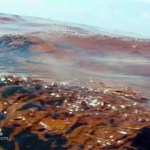gulf oil spill
A couple days ago I received this note:
"There was an article in the Huffington Post not long ago about an extreme worst case scenario with the oil spill - that a giant methane bubble bursts through the sea floor, ignites, causes a huge supersonic tsunami that would wipe out all of Florida, followed by a vaporization tsunami.
I've heard this described as "disaster porn", and certainly, the scenario smacks of it. But, there have been extreme natural disasters in the past, and not being a geologist, I can't help but feel some alarm at this, as I'm currently a resident of Tampa. I have…
I was on the phone this afternoon with a friend at what I'll describe as a highly respected national-type newspaper, and we almost simultaneously broke into complaint about the National Oceanic and Atmospheric Administration (NOAA).
What set us off was NOAA's grudging admission of the day, that despite angry earlier denials, there were indeed swathes of oil-saturated water coiling for miles, under the surface of the Gulf, emanating away from the site of the BP pipe break.
As The New York Times noted: "the tests confirmed that some toxic compounds that would normally be expected to…
(Just a note: The giveaway period for the audiobook of The Poisoner's Handbook has ended. If your comment is not published, it's too late to be considered for a free copy. But still glad to hear your ideas! Winners to be notified on Wednesday).
One of the most interesting - and I think important - comment threads on this blog has concerned risks posed by the gas methane, blamed (along with BP) for the devastating oil spill in April and still seeping into the water from the broken drill pipe.
"We don't know the composition of the crude oil as it is leaving the well head. This crude is…
tags: BP Fails Booming School 101, Gulf oil spill, political commentary, humor, outrage, political commentary, teaching, oil spill boom, Gulf of Mexico, BP oil spill, British Petroleum, streaming video
BP Fails Booming School 101, creating an environmental disaster and is failing to take the lead in cleanup. BP claims they "are prepared" to deal with such things as an oil spill -- if they are so prepared, then why is this happening? This video shows that, contrary to BP's lies about their preparedness, they actually are NOT prepared AT ALL. Unfortunately, our federal government is also…
So, at a Sunday news briefing, British Petroleum's CEO, Tony Hayward, announced that there are no underwater plumes of oil resulting from the April accident at the company's Deepwater Horizon rig in the Gulf of Mexico.
Why? Well, first BP's testing hasn't found any such evidence. And second, Hayward reminds us that, you know, oil floats. Or if we didn't get that: "Oil has a specific gravity that's about half that of water. It wants to get to the surface because of the difference in specific gravity."
Let's give the man this: there is definitely oil floating on the surface…
In a recent discussion on this blog, an interesting thread appeared: the idea that BP's heavy use of chemical dispersants to break up the Gulf oil spill was as much damage cover up as damage control.
Here are a few examples:
My suspicion is that the main reason they used these dispersants was to hide the oil from view.... Anything that will keep the oil out of site below the surface allows them a certain measure of plausible deniability regarding their knowledge of the spills true magnitude.
I think there is a big effort on the part of BP to minimize the aesthetic and…
The latest news from the Gulf of Mexico offers both relief (the "top kill" approach to ending the oil spill may be working) and dismay (the amount of oil pouring into the water is now thought to be closer to 20,000 barrels a day rather than the 5,000 barrels that BP has insisted on for weeks.)
In other words - at worst case - the U.S. Geological Survey estimates that the spill amount may be closer to 39 million gallons of oil so far, rather than the 11 million previously suspected. Now, I've spent the last week or so focusing on the chemical dispersants used to break down the oil,…
tags: Hazmat Dive into the Middle of the Gulf Oil Spill, Corexit, environment, Gulf oil spill, BP, British Petroleum, chemical dispersants, Philippe Cousteau Jr., Sam Champion, television, streaming video
What is the chemical dispersant, Corexit, doing to the oil in the Gulf? This video follows Philippe Cousteau Jr. and Sam Champion as they dive into Gulf's oily waters wearing hazmat uniforms. Their video shows that the oil is being broken up into tiny droplets that coat everything in their path ... birds, fish, whales, boats, the bottom of the sea and people in hazmat suits ... these small…
So, yesterday, a friend of mine suggested that BP should stand for Barren Planet rather than British Petroleum.
And today The New York Times reported that despite all the evidence that BP's favorite dispersant (yes, Corexit) is more poisonous and less effective than others on the market, and despite the fact that the EPA order the company to find an alternative by, um, yesterday, the company was still dumping the same old, same old chemical compounds into the Gulf of Mexico.
Despite the fact that there are 11 other approved dispersants on the EPA list.
Talk about warning…
The standard toxicity test for chemical compounds is called the LD50. LD stands for Lethal Dose and 50 indicates 50 percent. In other words, LD50 means the lowest dose at which a material kills half of the test subjects.
The results are usually given in milligrams of compound per kilograms of body weight. Many of these tests are conducted on laboratory rats. To give you a few rat results: the LD50 of table sugar (sucrose) is 29,700 mg/kg. For table salt (sodium chloride, NaCl) it's 3,000 mg/kg. Really poisonous substances, though, measure in the single digits: Sodium cyanide (…
I was going to just leave the oil spill in the gulf topic alone. Not because it isn't important, obviously it is. Rather, I wasn't going to do anything because I didn't really have anything to add to the topic. After a couple of readers requested it, I think I do have something to add. How exactly do you estimate the amount of oil flowing into the gulf?
What do I have to start with? A video. Here is a video of the undersea oil leak.
Now, I am not the first to estimate the oil flow rate (NPR on Purdue Prof's estimation and here a commenter make a quick calculation). Like I said, I am…

A Times story this morning reports that, according to both documents and scientists in the US Minerals Management Service (MMS), the MMS routinely silenced safety and environmental warnings from staff in order to grant permits for even huge, high-risk drilling permits, including the BP rig that blew.
It's a good (and nauseating) story, and I'm tempted to say it's timely. Yet this story would have been a lot more timely before the rig blew, no? As I read it, I wondered why I had not read it weeks ago, when the Obama administration started proposing an expansion of drilling off US coasts.…

